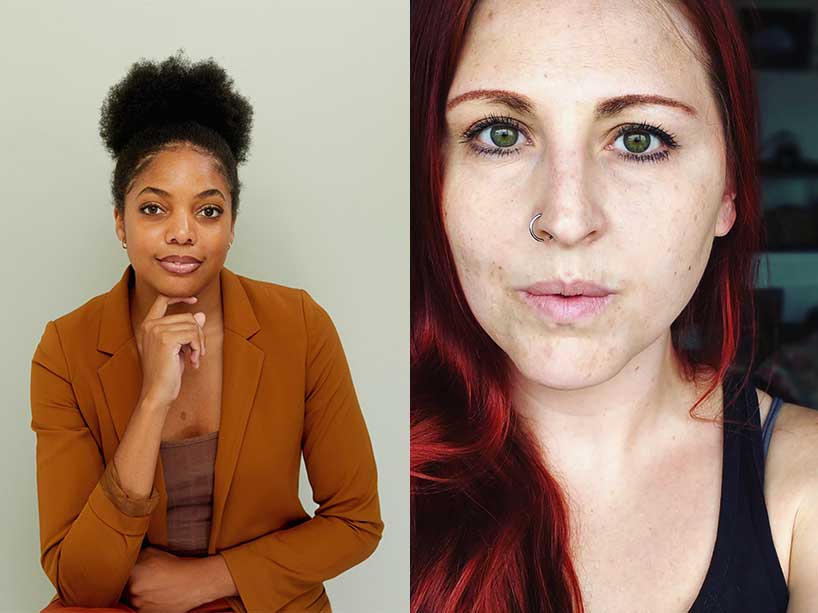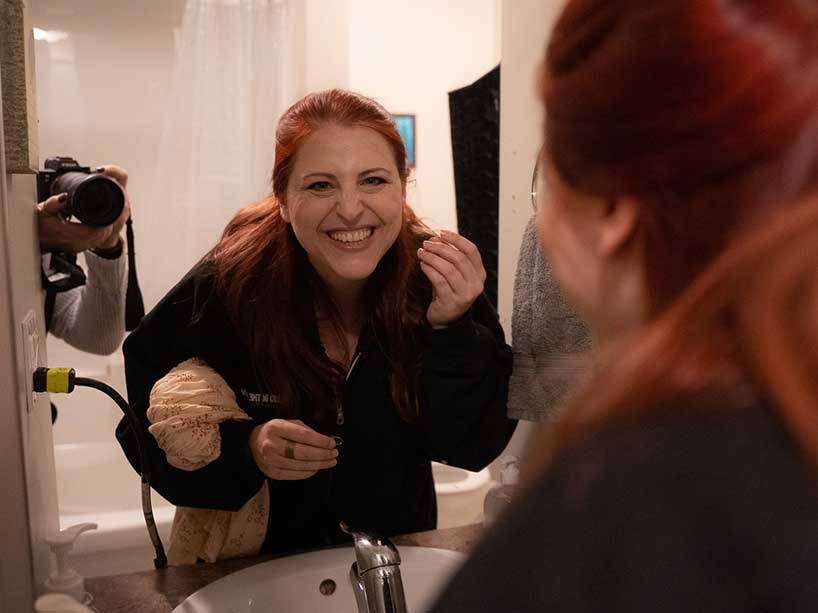Meet two women founders who are empowering others

Krystal Henry-Mathieu and Emily Schooley founded startups that are uplifting the voices of women from equity-deserving communities.
Whether you’re in a classroom, at work, enjoying your new hobby or going out to watch a movie, representation matters. When we see someone we can identify with in spaces we hope to access, we feel a sense of belonging that can empower us to believe in ourselves and our goals.
As we celebrate grit, resilience and innovation this Global Entrepreneurship Week, it’s important to recognize that women face more barriers than men in their entrepreneurial journeys. As a result, only 17 per cent (external link) of Canadian small and medium-sized businesses are owned by women.
A report on the state of women entrepreneurship in Canada, published by the Women Entrepreneurship Knowledge Hub (external link) (WEKH) supported by TMU’s Diversity Institute, shows that the average amount of financing for men-owned businesses is about 150 per cent higher than that for women-owned businesses.
Women with intersecting identities face even greater challenges, often having to fight harder to overcome biases and systemic discrimination. The report by WEKH highlights many such barriers, whether it’s Indigenous women being unable to access western financial services due to systemic exclusion, or 2SLGTBQ+ founders facing harsh public evaluation and difficulty obtaining funding and government assistance. These are in addition to challenges such as lack of networking opportunities, mentorship and training that many women from equity-deserving groups face.
Driving change for a better future
Finding success despite these challenges is a remarkable feat, but some entrepreneurs make it their mission to improve representation and pave the way for future founders.

Krystal Henry-Mathieu founded BLK Women in STEM, a platform that raises the profile of Black women in STEM fields and provides mentorship to young women hoping to follow similar paths.
Krystal Henry-Mathieu’s interest in the environment began when she was around five years old. She remembers watching the news with her grandparents as a young girl and getting curious about climate change, often asking adults around her what she could do to help.
Her passion for environmental science grew with her and she became sure about pursuing the sciences at an advanced level. She found that her teachers, however, weren’t able to look past her achievements as a soccer player and take her goals of building a career in science seriously. Today, Henry-Mathieu has a master’s degree in environmental science and management from TMU and works as an energy and carbon solutions analyst.
“I had teachers who didn't see my goals as realistic because of what it looks like in those fields – there aren’t a lot of people like me there. I had some teachers who straight up told me I wasn’t going to be welcome in those spaces,” Henry-Mathieu said. “There were others who felt like I would need to use sports to get me far in life, even though that was never what I desired to do. Hearing those types of things when you're young can be really tough.”
Those words didn’t stop Henry-Mathieu from chasing her goals. When she got to university and realized that she was the only Black woman in her program, she knew she had to do something to address the gap. She started BLK Women in STEM (external link) , a platform to help inspire young girls and give them valuable guidance and mentorship. The STEM magazine (external link) is a digital publication Henry-Mathieu created to amplify the voices of Black women and share the barriers they had to overcome in their pursuit of a career in STEM.
“I decided to start BLK women in STEM as a way to create a community for young girls and professional Black women in STEM. The STEM magazine provides an opportunity for Black women to share their accomplishments and give themselves a well-deserved pat on the back – something that women in all fields tend to shy away from. I think it’s important for women to understand that it’s a good thing to celebrate ourselves and our achievements. In fact, we should all make a habit of it,” Henry-Mathieu said.

Emily Schooley is an award-winning actor and filmmaker who founded Laughing Cat Productions to tell stories through an inclusive, women-focused, intersectional feminist viewpoint.
Emily Schooley wrote her first script at the age of six and has always been a performer. As a creative spirit, she was drawn to entrepreneurship and founded Laughing Cat Productions (external link) to combine her love for acting and storytelling with her mission to advance equity and representation in the film industry.
She’s currently working with two incubators at TMU, the Transmedia Zone and the Social Ventures Zone, to help grow her company.
“My own experiences of exclusion and exploitation in the film industry are what really made me decide to start creating my own work and start my own production company,” Schooley said. “It’s also sadly not uncommon for women across all industries to face some kind of sexual harassment, prejudice or an attack on their reputation, especially if they are speaking against harmful societal or industry norms.”
Schooley is also driven by wanting to change how women are portrayed on screen, and her work features them front and centre in a variety of roles. She wishes to see more women with intersecting identities play leading roles on screen as CEOs, lawyers and other powerful and empowered characters, instead of always being a caregiver or being of service to men in lead roles. Her 2017 short film, Life and the Art of Lying, was recognized by Swedish institute ValueCine for having over 90 per cent of screen time and dialogue by women.
“As someone who is both queer and invisibly disabled, I believe that it’s important to go beyond tokenistic diversity and really think about who we cast in what roles. Who we see on screen and how we see them portrayed is how we see them in real life, and that’s why I’m so passionate about intersectional inclusion,” Schooley said.
Having experienced feelings of self-doubt, Schooley recognizes that many women founders hold themselves back and question their capabilities. “A lot of the time, the world at large tries to keep us small. But we deserve to discover how much we’re actually capable of.”
In systems that were designed to work against marginalized communities, Schooley and Henry-Mathieu are making sure that the women who come after them feel like they belong at any table they choose to sit at.
Related stories:
- On International Women’s Day meet five women who are blazing their own entrepreneurial paths
- National program helps students turn their scientific insights into viable ventures
